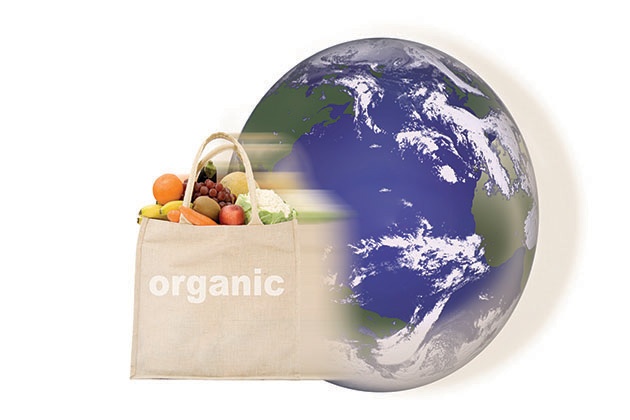Study shows growing food organically has higher impact on klimë because of more land use
Organike food has become very popular in the last decade as consumers are becoming more aware and health and quality conscious. Organike food is produced naturally from bujqësinë organike which aims to increase the naturalness of food by minimizing chemical interference when producing it. So, organik food does not include any pesticides, synthetic fertilizers or other artificial additives. The produce of meat, eggs and other products from animals, is termed organik if animals were not subjected to any antibiotics or growth hormone supplements. Every food item produced organically is also more expensive than conventional food because without use of chemicals or additives, it takes longer time to produce organik food and thus requires more resources in terms of land, time etc. The demand for ushqimit organik is certainly higher and rapidly growing compared to the supply which is further contributing to high prices of organik ushqim.
Conventional farming vs organik bujqësi
Studiuesit në Universitetin e Teknologjisë Chalmers, Suedi zhvilluan një metodologji të re për të analizuar ndikimin e bujqësinë organike on klimë via the factor of land-use by comparing conventional food production in agriculture with organik production. Their study showed that producing organik food contributed to higher emissions into the mjedis. Për shembull, organik peas farmed in Sweden had almost 50 percent higher impact on klimë while for other foods like Swedish winter wheat this number was as high as 70 percent. This is attributed to two reasons; first, to the more land required for organik farming and second, since fertilizers are not used in organik farming the yields per hectare is considerably reduced. For every single food product, be it organic meat or dairy product the land required is much more for organic production compared to conventional bujqësi. This greater land use automatically leads to higher carbon dioxide (CO2) emissions because for every land which needs to be cultivated, forests are converted by cutting trees leading to deforestation. Deforestation accounts for 15 percent of total greenhouse emissions on our planet. Simply put, felling of trees is doing an irreversible damage to the environment and to the ecosystem (flora and fauna).
"Kostoja e mundësive të karbonit"
Në studimin e tyre të publikuar në natyrë Studiuesit përdorën për herë të parë një metrikë të re të quajtur 'Kosto e mundësive të karbonit', e cila vlerëson gjurmën e karbonit përmes efekteve të përdorimit më të lartë të tokës dhe se si ajo kontribuoi në emetimet e CO2 nga shpyllëzimi. Pra, emetimet e CO2 u grafikuan kundrejt rendimentit total të ushqimit, në të cilin raporti i ushqimit organik sigurisht që ngeli. Është marrë parasysh sasia e karbonit të ruajtur në pyje dhe si rezultat i shpyllëzimit CO2 lëshohet në atmosferë. Çuditërisht, faktori i përdorimit të tokës dhe efekti i tij në emetimet e CO2 nuk është analizuar kurrë më parë në asnjë studim të mëparshëm, ndoshta për shkak të mungesës së metodave të drejtpërdrejta dhe lehtësisht të zbatueshme. Metrika e re 'Kosto e mundësive të karbonit' lejon një krahasim të thjeshtë por të detajuar. Prodhimi total në vend dhe rendimentet totale për hektar për statistikat e bujqësisë organike dhe konvencionale janë siguruar nga Bordi Suedez i Bujqësisë.
Organike bujqësi never uses artificial fertilizers as the crops are nourished and nurtured through nutrients naturally present in the soil and if needed only natural pesticides are used. The flipside is that valuable resources like land, water and energy consumed are much higher in organic farming and its relevant to understand how it can be made sustainable over a period of time. According to this study consuming organically produced beans or chicken is better for the klimë then let’s say conventionally produced beef. And eating pork, chicken, fish or eggs will have lower impact on environment than say eating beef or lamb.
However, this study does have limitations – as it was restricted to a few crops and in only one region of a country. So, the recommendation is not to stop consuming organic food altogether. But it is clear, where impact on klimë is concerned, organic food fares worse than conventional food because of the bujqësi methods. There is still lack of substantial scientific evidence to show that organic food is more health friendly or even environment friendly than conventionally farmed food. So even if one assumes organic food is better for people, it may not be so good for the planet! More data is certainly needed to arrive to generalized conclusions. The analysis in this study could also be correlated to biofuels as their production also needs larger land area compared to conventional fuels.
***
{Mund të lexoni punimin origjinal kërkimor duke klikuar lidhjen DOI të dhënë më poshtë në listën e burimeve të cituara}
Burimi (s)
Searchinger TD et al. 2018. Assessing the efficiency of changes in land use for mitigating klimë ndryshojë. Natyrë. 564 (7735).
http://dx.doi.org/10.1038/s41586-018-0757-z






































